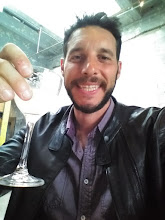“I’ll tell you, ahm-in tight with one a the six or seven men who started th’whole shit-stompin, whore-fuckin, hard-drinkin, money-pissin hole of a town in th’firs place.”
The driver feels compelled to feign a certain amount of awe equal to the hitchhiker’s gusto. He could care less about Las Vegas, let alone who this joker knows and what he has planned there. He figures any minute wasted there, or anywhere, is a minute given without a fight to his prey: the animal who took Paula. There is no way that this cretin is going to get off so easy, especially not with a diversion in some desert hole with some unscrupulous wayfarer he just met. If the hitchhiker wants to live it up for one night in Las Vegas, then the driver would be happy to leave him anywhere on Freemont he pleases.
Enormous organ cacti push up all around the two as they head further east. The prickly spires are hard to make out against the dark blue curtain of stars. If anything, they are blacker than the sky itself. Cutouts, as if tailored from pure night, mark the land in shapes of giant cacti. Their monstrous, invisible fingers twist over each other as they stretch up and out, grasping towards nothing.
The driver drinks in the air as it refreshes his nostrils, his throat, his dry desert lungs. There’s a sweet crispness to the air, but he can’t be sure if it’s actually emanating from out there, in the desert, or is merely how he imagines an arid winter should smell. Either way, as sweet and briefly rejuvenating as it may be, he would sooner trade it all in to be standing face to face with the coward who took his love, his life. Better yet, he would forfeit his life to kill, to maim, or to make his fiancée’s killer live forever, as long as it is with a pain so unbearable that he would beg for a death that never comes.
Thoughts of revenge, and the million different ways to inflict it, make the driver’s chest grow warm, like the afterglow of whiskey. Better than whiskey, it takes him away to a day or two into the future. Unlike the time travel of a drunken haze, the driver is certain of this future and it is clearer than any alcoholic hallucination:
He has tracked down and surprised the vermin, of whom he has never seen and only knows a name; or a nickname, to be precise. The man is armed. He reaches for his piece and the driver allows him, all the while watching coolly from behind a pointed barrel. “Go head. Make yer move.” The dialogue will have to be revised -or better yet, improvised on the spot- so it sounds less like the outtakes from a ‘B’ Western.

